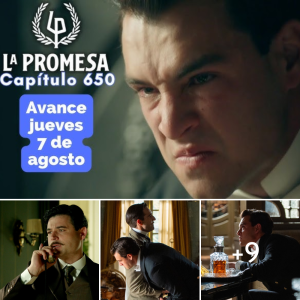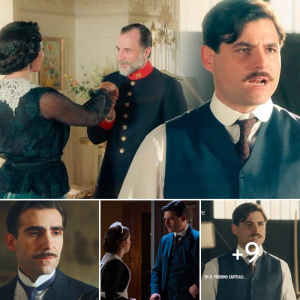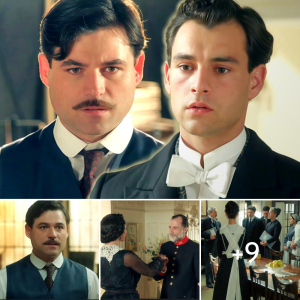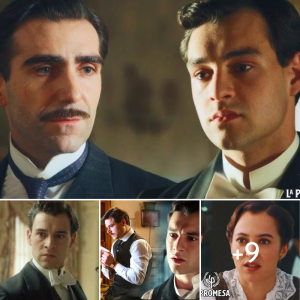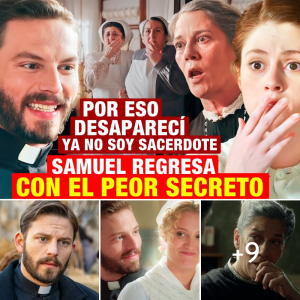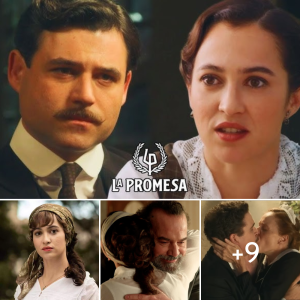La Promesa’s 648th chapter opens with a shocking revelation: Alonso, the Marqués de Luján, has discovered who was behind the destruction of the infamous portrait of Cruz Izquierdo. The delicate and almost surreal tension that permeates the air of La Promesa reaches a fever pitch. Every room holds a whispered secret, and every corridor is alive with the scent of betrayal. The symbolic importance of the portrait, which has been in the family for years, makes the act of violence even more profound. But who would commit such an atrocity, and why?
Alonso, a man used to keeping his composure, cannot ignore the gravity of the situation. His wife’s portrait—the very image of power and elegance—has been torn to shreds, an assault not just on her but on their family’s honor. With his usually calm demeanor replaced by a fierce determination, he calls for a meeting with the entire family. No exceptions. It’s time for the truth to come out, no matter the cost.
Yet, as the family gathers under the weight of Alonso’s authority, a series of smaller, more personal stories unfold in the background, adding depth to the mystery. María Fernández, anxious and desperate due to Samuel’s continued silence, reaches out to Manuel for help, hoping he can shed light on Samuel’s whereabouts. Meanwhile, Catalina, torn between her social ideals and her romantic feelings for Adriano, finds unexpected solace in Simona’s wisdom, which may change the course of her path. Pía, ever watchful, begins to suspect that Cristóbal isn’t who he appears to be, and with each passing day, her suspicions grow.
As Alonso ponders the mystery of the broken portrait, the family is left to wonder—are these secrets all connected? What hidden truths lie within the walls of La Promesa? And who is willing to pay the price for the truth to come to light?
But there are still deeper layers to the unfolding drama.
In the heart of La Promesa, far removed from the tense family dynamics, lies the deeply personal turmoil of Manuel de Luján. His heart is pulled in two directions: torn between his duty to the family business and his yearning for independence. Leocadia’s offer to buy out his share of the aeroplane company seems like a way out, yet there are dangers he has yet to uncover. The last phone call from his brother Pedro’s business partner, just before the tragic accident, holds a secret that could change everything. Leocadia knows the truth but has chosen to stay silent, keeping Manuel in the dark.
Toño, Manuel’s trusted mechanic, senses that something isn’t right. His distrust of Leocadia grows as he urges Manuel to reconsider the offer. Toño sees the hidden dangers in her actions, but his warnings seem to fall on deaf ears. As Enora, the seductively persuasive voice of reason, encourages Manuel to seize the opportunity, Toño feels helpless. He knows Manuel is about to make a catastrophic mistake, one that could cost him much more than just the company.
Elsewhere, María’s anxiety grows as she worries about Samuel. The fear of something having happened to him gnaws at her, and her worst suspicions are soon voiced by her friend Teresa. What if the Church had intervened? What if Samuel’s silence isn’t just about fear, but something darker? María’s heart races as she pleads for Manuel’s help, her last hope.
Meanwhile, Catalina wrestles with her own ideals and feelings. Her fight for workers’ rights has isolated her within her own family, particularly from her cousin Martina and her lover Adriano. In search of advice, Catalina turns to Simona, a woman who has always been her confidante. But Simona, wise beyond her years, offers Catalina a perspective she wasn’t expecting: that sometimes, love and duty require us to find a middle ground. Simona’s words of wisdom, though gentle, force Catalina to reconsider her path, presenting her with a choice—continue her fight, or learn how to balance both worlds.

The family’s gathering reaches its climax when Alonso confronts everyone in the main salon. The broken portrait of Cruz Izquierdo looms over them all, and Alonso’s voice carries an authority that sends a chill through the room. He accuses someone in the family of committing the crime, and the room fills with tension as each family member reacts to the accusation.
But it’s in this moment of high drama that the truth begins to emerge—López, the cook, nervously enters the room, delivering news that will change everything. In the attic, a knife and a woman’s embroidered glove bearing the initials MDL have been found. The identity of the culprit is clear. Martina, the one person who seemed the least likely, stands accused of the crime.
Martina, unable to deny the evidence, breaks down in tears. The truth, as devastating as it is, has finally come to light. The destruction of the portrait wasn’t a rash act of anger, but a calculated decision born from fear, jealousy, and desperation. Martina’s actions have torn the fabric of trust within the family, and though the mystery is solved, the fallout is only beginning.
As the family confronts the horror of Martina’s guilt, the rest of the palace is filled with their own storms—Manuel’s indecision, Catalina’s personal dilemmas, Pía’s suspicions about Cristóbal, and María’s search for Samuel. Each of these stories is on a collision course, and the consequences of the broken portrait may be far-reaching indeed.
The truth has been revealed, but at what cost? Only time will tell if the family can rebuild what’s been shattered.

